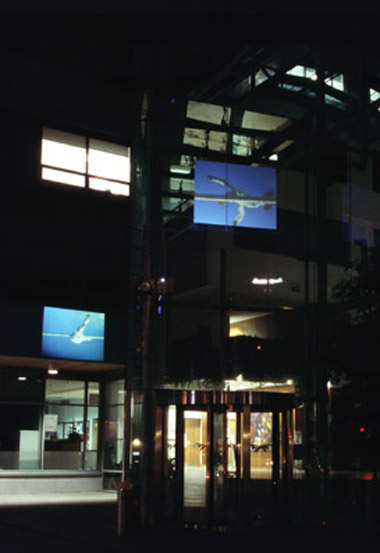 |
| Brian Duggan; During the Meanwhile, 2005, video projection: courtesy of the artist |
The sight of a man in a whiter-than-white body suit engaging himself in futile acts is probably enough to prise a chuckle from the most sober of financiers (amidst guffaws from passing students). Bemusement is the first reaction to Duggan’s series of videos, in which the aforesaid ‘man in suit’ is seen attempting, and failing, to jump onto a wall, or kick a tree down, or climb up onto a horizontal bar, and so on. This bemusement is hardly lessened when Duggan inverts certain images so that the figure falls upwards from the bar, or climbs backwards up, or rather down, a ladder. All these peculiarities are supposed to lead the casual passer-by away on a tangent, if only momentarily, and to add a touch of absurdity to a space that is wholly constructed with serious money in mind.
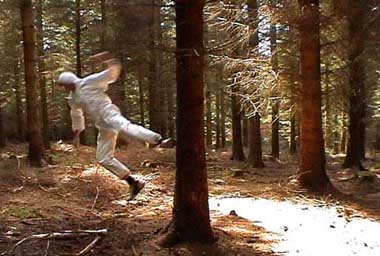 |
| Brian Duggan; During the Meanwhile, 2005, video projection; courtesy of the artist |
These tasks are ‘Herculean’ in a diminished sense: there is some reference to the rather exhausted belief in the artist as a heroic figure, struggling with the barely possible in order to test the limitations of human endeavour. Here, those limitations are anything but sublime or preternatural. But the repetition to distraction of pointless tasks breaks slightly with the habits of the space (the IFSC complex) and of those passing through it, just as it turns back upon those habits and points up their circularity.
Habit is what keeps us together: habit “is the ballast that chains the dog to its vomit. Breathing is habit. Life is habit. Or rather life is a succession of habits, since the individual is a succession of individuals […] The old ego dies hard." (Samuel Beckett) Some might say the ‘old ego’ cannot die, but it does become exhausted sometimes, especially when it embarks upon ‘puny exploits’ (art, rock climbing) with no summit in sight. Like Beckett, Duggan realises that ‘failure, impotence and ignorance’ can be a means by which to put a skid under habits. And, of course, artists are pretty good at failing: as Beckett says elsewhere, “to be an artist is to fail, as no other dare fail, that failure is his world, and to shrink from it is desertion, art and craft, good house keeping, living."
Who is the man in the white suit? No one in particular: he is the proverbial blank canvas upon which to play with a few associations (painter-decorator, forensic scientist, Beastie Boy, anti-nuclear protestor, and so on). Whatever associations might be made, the white suit is primarily a means of effacing the (artistic) identity of the protagonist, the artist himself. This effacing of identity is particularly significant vis à vis the habitual nature of the various peculiar activities gathered under the heading of ‘leisure’, or more precisely, ‘recreation’: activities set against those of ‘work’, where one re-creates the ego, the ‘real me’, for which there is little space in professional life.
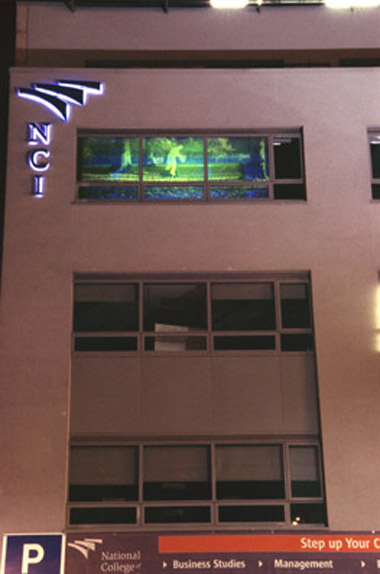 |
| Brian Duggan; During the Meanwhile, 2005, video projection: courtesy of the artist |
The timing of these videos – between 5pm and 9am – coincides with the time allowed for leisure, and they are to be seen during one’s passage, ‘during the meanwhile’, between work and leisure. The distinction between work and leisure is, of course, an ideological one, and it is essential to the maintenance of this (bourgeois) ideology – and, indeed, to Duggan’s ‘subversive’ situation ‘in-between’ – that the two categories are not confused. But, is this distinction so crucial as it was? In the age of the ‘corporate picnic’ and the ‘networking event’, business is done – money, ideas and contacts are exchanged – in the relaxed and informal environment of leisure activities: and moreover, the new materials developed through play are an important resource in the market of immaterial labour. This instrumentalisation of leisure time is disguised, however, when an aesthetic frame is set up around its events, which lends shared activities a spurious spontaneity, informality and ‘lifestyle’ conviviality.
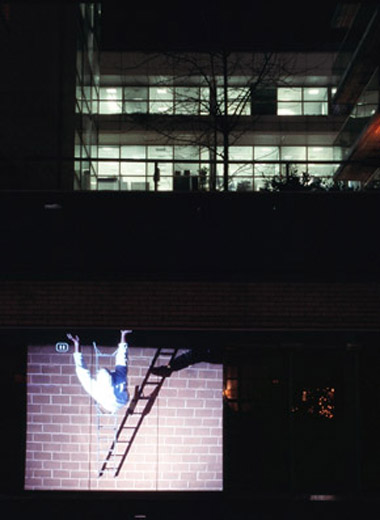 |
| Brian Duggan; During the Meanwhile, 2005, video projection: courtesy of the artist |
So, it is not simply a matter of leisure being a supplement to work – that is, of the former being licensed by the latter – but of the two being largely indistinguishable, as both are brought under the precepts of a means-driven capitalist rationality, where a ‘work / life balance’ must be maintained as a precondition of greater efficiency. This rationale is the ‘discipline’ that encroaches upon all activities or, if you like, the system that inscribes itself into the Lebenswelt . It is one which privileges performance, and hence efficiency, over cognition; and it is exercised through increasingly fine channels, not only as a mechanism of repression but also as one which induces pleasure, distraction and forms of art practice .
Ever since its emergence as a space for the performance of class and gender identity, leisure has had a specific ceremonial function that contradicts its informality. Playing on failure, Duggan’s exercises snub this function, denying efficiency, performing badly: but this is also a weakness – these exercises, going nowhere, can only fail. And if failure itself can become a habit, then the dog is still chained to its vomit.
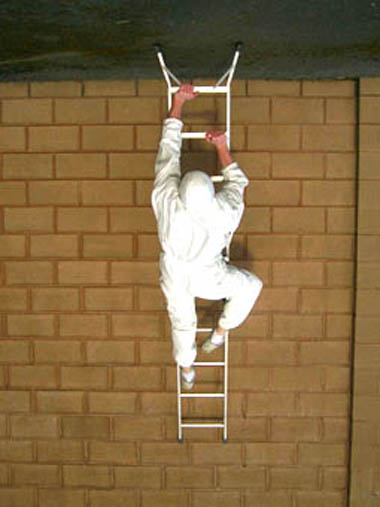 |
| Brian Duggan; During the Meanwhile, 2005, video projection: courtesy of the artist |
The experience of Duggan’s figure is ‘schizophrenic’, that is, an experience with little coherence or temporal continuity; without horizons, and so without identity other than one caught in the emotional intensity of a perpetual present, absorbed in the task at hand, however banal. As such, its activities remain opaque, singular and myopic, producing nothing but themselves, and thereby destined to repetition without even knowing it.
These ‘schizophrenic’ activities might avoid full prescription by the intricate ‘grid of ‘discipline", but at the same time they get stuck within their own circular logic, playing with what is given rather than what might be desirable – and, in the end, the wall is just too high to jump over without a leg-up.
Tim Stott is a critic based in Dublin.